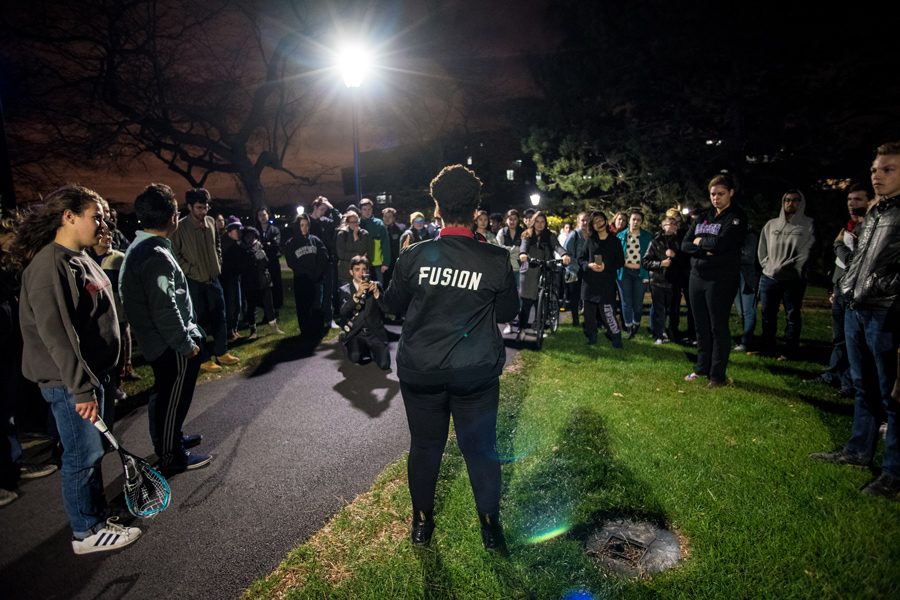One year after election, NU community reflects on Donald Trump’s presidency
Daily file photo by Colin Boyle
Students gather on the Lakefill on the night of the 2016 presidential election. One year into Donald Trump’s presidency, students, faculty and staff have voiced concerns with his leadership.
November 9, 2017
Weinberg junior Sammy Cuautle said he knew he was taking a risk by voting for President Donald Trump in the 2016 election, but hoped that other Republican politicians would be able to steer the party in the right direction.
Reflecting on the past year, Cuautle, secretary of public relations for College Republicans, said his hope has not been fulfilled, calling Trump’s administration a “circus.”
“We’ve barely managed to pass a budget and there have been no steps taken towards tax reform,” Cuautle said. “Health care reform was a huge disaster … our diplomacy situation has really deteriorated because we can’t coordinate between the State Department and the White House.”
One year after Trump’s controversial election, students across the political spectrum voiced concerns with Trump’s leadership and noticed increased activism on campus, while some faculty said they appreciated the University’s response to recent national policies.
Cuautle said on campus, the election has led people from both political sides to become more vocal and politically involved.
College Republicans president David Donnelly, who voted for Libertarian candidate Gary Johnson in the election, said the Trump administration has not “gotten a lot done” in the past year.
The McCormick senior added that, aside from the first few days of shock after the presidential election, he does not think campus has changed “radically” because of Trump. He said, however, that it was a reminder of the importance of voting.
Donnelly said in his four years at NU, it has become increasingly difficult to plan College Republican events due to security concerns and a “political fervor” he partly attributed to Trump’s election.
He added that despite this difficulty, the NU community has been particularly tolerant of political differences.
“I understand that I am definitely an ideological minority here and people are going to disagree with me, and that’s totally fine,” Donnelly said. “Everyone at Northwestern is respectful.”
But Cuautle, a Republican and Trump supporter, said many people at NU stopped talking to him around the election, adding that their perceptions of him changed “radically.”
College Democrats co-president Calvin Anderson said he was “shocked” when Trump was elected, and that his presidency has continually threatened marginalized communities at Northwestern.
“In general, there’s a lot more fear,” the Weinberg junior said. “And in some ways, there’s been a lot more activism around very sensitive issues that we can’t avoid in ways we might have been able to when they seemed less present during the Obama era.”
Anderson noted student activism around issues such as Trump’s travel ban and immigration rhetoric, citing the reaction to the U.S. Immigration and Customs Enforcement public relations officer who visited campus during Spring Quarter.
Though Anderson said the negatives of Trump’s administration and “hateful rhetoric” used by right-wing politicians in the past year outweigh the positives, he added that the election succeeded in disproving the ideal of a “colorblind” society.
For Robert Brown, NU’s director of Social Justice Education, Trump has “shined a brighter light” on issues such as sexism, racism and classism.
“The election didn’t bring about new issues,” Brown said. “Many of these ‘-isms’ and issues don’t necessarily have a political party affiliation, they are seen throughout our institutional systems and structures.”
Brown also said the University has upheld its values by being “proactive” in responding to Trump’s policies.
Following several of the Trump administration’s policy announcements, such as the travel ban and the proposed end of the Deferred Action for Childhood Arrivals program, University President Morton Schapiro publicly announced support for affected students.
Political science Prof. Alvin Tillery, who called the Trump administration “the worst administration in the television age,” said he appreciated the University’s response to national politics.
“I’m heartened by the fact that our University leadership spoke up for their values, which are the values of openness and tolerance and immigration,” Tillery said. “It’s good to work at a place where they are speaking out in the name of values that we in academia hold dearly.”
Anderson said while the University has been “responsible” in speaking out about issues that will affect students, he noted there are some more “troubling” things, such as the chairman of the Board of Trustees’ donations to the Trump campaign.
“In past elections, it wouldn’t have mattered if there was a Republican donor on the board — there’s nothing inherently wrong with somebody supporting that political party,” Anderson said. “But in lieu of everything that Trump represents, things like that are super troubling.”
He added that anything other than a rejection of the negative aspects of Trump’s administration is “disappointing.”
Anderson said discrimination against marginalized communities can no longer be ignored during the Trump presidency, which has made it somewhat easier to organize “forcefully against the hate.”
He added that College Democrats can use Trump’s election as “fuel for the fire” to continue advocating for Democratic politicians in future elections.
“Marginalized groups that were victims of so much before just have to worry even more,” Anderson said. “We have to do everything we can to fight back against all of these threats against our community members that come from the Trump administration.”
Email: [email protected]
Twitter: @allymauch


